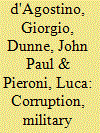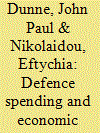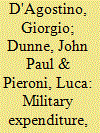|
|
|
Sort Order |
|
|
|
Items / Page
|
|
|
|
|
|
|
| Srl | Item |
| 1 |
ID:
116064


|
|
|
|
|
| Publication |
2012.
|
| Summary/Abstract |
This paper considers the effect of corruption and military spending on economic growth, analysing both the direct impact of public spending and the effect of allocating resources between categories of public spending within the framework of an endogenous growth model. The model exhibits non-linearities as a result of the links between the components of public spending, corruption and economic growth. The main findings of the empirical analysis confirm the expectation that corruption and military burden lower the growth rate of gross domestic product per capita. They also suggest that when the effect of the complementarity between military spending and corruption is omitted, as in most studies, the impact of military burden on economic performance is underestimated.
|
|
|
|
|
|
|
|
|
|
|
|
|
|
|
|
| 2 |
ID:
116060


|
|
|
|
|
| Publication |
2012.
|
| Summary/Abstract |
Over the last 30?years, there has been an impressive amount of empirical work on the defence-growth nexus, using different methodologies, models and econometric techniques and focusing on individual case studies, cross-country studies or panel data studies. Despite the number and the variety of studies, the evidence on the defence-growth relationship is still far from conclusive. Rather surprisingly, very limited work has been published in the relevant literature for the European Union despite the continuous discussions for a Common European Defence Policy that would require an assessment of the economic effects of defence in this region. To fill in the gap in the literature, this paper employs an augmented Solow-Swan model and estimates it both with panel and time series methods to provide empirical evidence on the economic effects of defence spending in the EU15 over the period 1961-2007. Overall, evidence derived from both panel and time series methods is consistent and suggests that military burden does not promote economic growth in this region.
|
|
|
|
|
|
|
|
|
|
|
|
|
|
|
|
| 3 |
ID:
167859


|
|
|
|
|
| Summary/Abstract |
While not always a concern for the general economic growth literature, the debate over the effects of military spending on growth continues to develop, with no consensus, but a deepening understanding of the limitations of previous work. One important issue that has not been adequately dealt with is the endogeneity of military spending in the growth equation, mainly because of the difficulty of finding any variables that would make adequate instruments. This paper considers this issue, using an endogenous growth model estimated on a large sample of 109 non-high-income countries for the period 1998–2012. The empirical analysis is framed within an instrumental variable setting that exploits the increase in military spending that occurs when unrest in a country escalates to turmoil. The estimation results show that endogeneity arising from reverse causality is a crucial issue, with the instrumental variable estimates providing a larger significant negative effect of military spending on growth than OLS would. This result is found to be robust to different sources of heterogeneity and different time periods.
|
|
|
|
|
|
|
|
|
|
|
|
|
|
|
|
| 4 |
ID:
116061


|
|
|
|
|
| Publication |
2012.
|
| Summary/Abstract |
This paper makes a contribution to the debate on the economic effects of military spending using a large cross-country panel data-set for 1988-2006. As well as providing a relatively up to date analysis, sub-groups are created that allow the analysis to focus on groups of countries at different income levels and Sub-Saharan Africa (SSA), an area which has seen a large number of damaging conflicts. Estimating the empirical growth model gives results that show variation across the sub-groups, with the general picture of significant negative short-run effect and insignificant long-run effect of military burden on per capita GDP growth, not consistent across the different income groups. In addition, breaking down the SSA group into those involved in conflict and those that are not, provides some further intriguing findings that suggest the value of further work on the impact of conflict on growth.
|
|
|
|
|
|
|
|
|
|
|
|
|
|
|
|
|
|
|
|
|